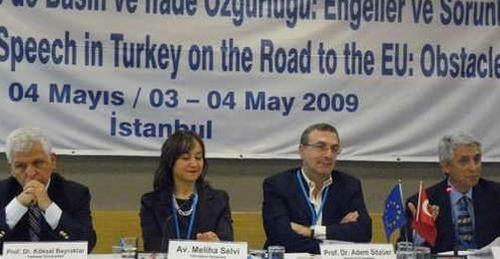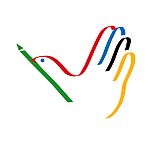On 3 May, World Press Freedom Day, the Turkey Journalists’ Trade Union (TGS) and the European Federation of Journalists (EFJ) co-organised a conference on the freedom of expression.
The second panel of the conference was concerned with “Legal Bases of and Obstructions to Press Freedom and Freedom of Expression”.
Prof. Adem Sözüer, Prof. Köksal Bayraktar and communications lawyer Fikret İlkiz said that even when laws did not create problems, implementations did.
Too many detained
Sözüer and Bayraktar gave as an example the 120,000 people currently in prison. 70,000 of them are detainees who were arrested and are awaiting their trial. According to Sözüer, 50,000 of these 70,000 are in prison unnecessarily, and Bayraktar believes the detentions are used as a method of punishment. Bayraktar referred to the Detention Penal Code as a “bleeding wound”.
Referring to the latest quarterly BIA Media Monitoring Report, Sözüer supported the report’s criticism of the fact that the Ministry of Justice was able to decide wether or not investigations or prosecutions under Article 301 were launched.
Arbitrary implementation
He pointed to the case of journalist Hacı Boğatekin, who was arrested after levelling an accusation at a prosecutor. “You can see this not only in the southeast of the country, but also in Thrace. You can find yourself in prison if you accidentally splash the wife of a public official with mud when you are driving your car.”
Journalists should not be prosecuted for doing their jobs
Bayraktar also pointed at the long duration of trials and to Article 26 of the Turkish Penal Code which states that “A person who uses their rights cannot be punished”. This article is not publicised by judges, prosecutors or experts, but it should mean, in practice, that journalists who are carrying out their profession should be safe from prosecution.
Bayraktar also emphasised that of the 369 articles in the Penal Code, 26 were concerned with limiting the press. “This Turkish Penal Code is not democratic. It does not limit itself to punishing, but even victimises people with imprisonment. The Turkish Penal Code and the Procedural Law need to be revised.”
He pointed out that some issues were dealt with both in the Turkish Penal Code (TCK) and the Press Law, leading to confusion. Thus, both Article 285 of the TCK and Article 19/1 of the Press Law were concerned with violations of secrecy, while Article 288 of the TCK and Article 19/2 of the Press Law dealt with attempts to influence the judiciary process. Bayraktar further criticised the judiciary for being keener to apply the TCK, which implies prison sentences.
Dangers for journalists in southeast
Lawyer İlkiz supported the criticisms of the previous speakers. He drew the audience’s attention to problems which journalists face in the southeast of the country, saying, “12 journalists have been killed in that area and the perpetrators are still at large.”
He pointed out that European countries were discussion how to protect research journalism in an environment of anti-terrorism policies, but that Turkey was still experiencing dozens of violations of the freedom of expression and press freedom. He added that there were no satisfactory regulations on “state secrets” or the protection of personal data.
İlkiz said that journalists should take an active role in the discussion of two draft laws, one concerning state secrets (accepted by cabinet on 7 April) and one on the protection of personal data (sent to the parliamentary presidency on 22 April 2008) in order to avoid “bad surprises”. (EÖ/AG)












